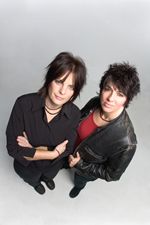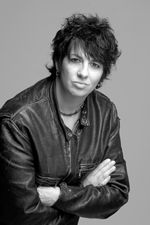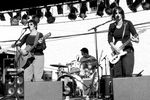social bookmarking tools:
 |
|
| Available RSS Feeds |
|---|
 - Top Picks - Top Picks |
 - Today's Music - Today's Music |
 - Editor's Blog - Editor's Blog
|
 - Articles - Articles
|
Add Louisville Music News' RSS Feed to Your Yahoo!
|

THE LUCK OF IRRATIONAL FEAR
O fortune, variable as the moon, you ever wax and wane; this detestable life now maltreats us, then grants us our wildest desires; it melts both poverty and power like ice.
-"Fortune, Empress of the World,"
from Carmina Burana
I'm a wrecking ball - demolition dust. I hope you're not in my way - not in my wake. Leaving your small mind - Leaving your small life - Watch me rise.
-"Doggy Dog World,"
Rebecca Reed
There was a snap in the air on that Saturday night in mid February. My wife and I walked away from our car parked against the curb on Preston Street, heading toward Uncle Pleasant's tavern. Close to its entrance stood a knot of five young people: four young women and a guy. The tavern's side door opened behind them and a wiry youngster in a black t-shirt and black wool cap rolled a battered amp onto the sidewalk, the metal casters rumbling on the concrete. The young women were gushing at the guy standing with them, their praises loaded with words like "awesome" and "kick ass," (annunciated as if each word was its own declarative sentence, with force and certainty). One of them was talking on a cell phone, informing the person on the other end that they were finished. The blue glow from the phone's lighted screen and touchpad framed one side of her face like a fluorescent prosthetic jaw.
Clearly the opening band had finished it set and was loading out. Clearly the girls had liked the show.
Inside Uncle Pleasant's, a large black-and-gray tabby named Baby lounged on a striped easy chair next to the entrance. Up at the bar, two women were being served beer in frosted glasses. A large slice of orange bobbed in each. Rebecca Reed and Lynn Elliot, the two front women of Irrational Fear, had just finished their sound check and were getting ready to play a short set. Sandwiched between two heavy rock acts, they faced a task: keeping the ones who were there entertained with their easygoing alt-country and rock sounds while warming up the people coming in for the third band that evening. Considering where they were playing that crisp February night, they probably had nothing to worry about.

For years Uncle Pleasant's was known as the place where anything could be played as long as it was good: a slam dance festival one night, Bluegrass the next, then maybe two nights of jazz. It went dark for a few years (a common story in Louisville: bar costs high, crowd attendance low, nothing left to do but flip the chairs onto the tables and shut off the lights as you leave), but it reopened last autumn. The place is on a block of Preston Street that has begrudgingly given itself over to the changes of the past five decades. Just half a block north of where it intersects with Eastern Parkway, the neighborhood has retained several landmarks from the past. A movie theater that has been converted into apartments, its sign hanging at a right angle from the front, the name obscured by a thick coat of black rust. A carpet store in a wide building with large picture windows and beveled entrance stoops that cannot hide its former iteration as a dress shop. A three-story red brick building with a tavern on the ground floor and an entrance to the apartments above it in the center of the building, its name in black metal letters on the front of the entrance's overhang. St. Joseph's Infirmary used to occupy the large parcel of land behind Uncle Pleasant's. It was torn down more than 20 years ago. In its place, tract apartments rented mostly by University of Louisville students.
Just like the music played at Uncle Pleasant's, both then and now, the neighborhood has a stubborn charm with a modern gloss. Luck has spared all of it from suffering the same fate as the major hospital that once served as its anchor. It is like an old favorite great-uncle who's always glad to see you, the one who still has a shelf full of cedar knick-knacks he picked up from roadside souvenir stands on his trips across the country, ones he's had since before you were born, mounted right over his plasma TV set with the Dolby 5.1 surround sound. It has durability, comfort and a touch of flash.

Just like the music of Irrational Fear.
During their 40-minute set, Reed and Elliott, backed by their current rhythm section of drummer Donnie Arbuckle and bassist Derrick Carpenter, got attention and warm applause from the crowd at Uncle Pleasant's. At one point an impressed new fan brought each of the women a shot of peppermint Schnapps. There was a subtle energy in the room. And both women felt it. Before they played the final two songs in their set, Elliott said her thanks to the crowd, then, in her honey-brandy voice, capped it with, "Spring's comin'. Be happy."
Reed and Elliott both are: happy about performing, about their debut CD, about the opportunities fortune has placed in their paths (or, put another way, the stuff they've lucked into). It has been hard work since they formed six years ago, but they payoffs have been sweet.
"Original bands really have to work a lot harder, I think, to make a living at it," Elliott said in an interview one week earlier. "We want to make a living at it, but the reality of it is it's gonna take us a little longer to make our stamp, get people used to seeing us, used to hearing our music and liking it, identifying with it and coming back to see us again.
"It takes time. It's not an instant gratification. There's more to it than just showing up and playing."
It was Super Bowl Sunday and the only people not watching it that evening in early February were sex fiends, the genuinely disinterested, the apathetic and us, seated around the table at a nearly vacant Heine Brothers coffee shop on Bardstown Road. Elsewhere in the city, clumped around television sets, people watched the Philadelphia Eagles play the New England Patriots in the 39th Super Bowl: a diehard team hot for a take-all victory facing the team that could become the first professional football dynasty of the millennium. Like a metaphor of what Reed had said, both teams did more than just show up and play.
"It's so much more than the money," Rebecca Reed added. "It would be wonderful and nothing better than to get big, but I just don't feel it. `Cause we love what we do, the process of it."

The process of becoming Irrational Fear began about eight years ago when Elliott moved to Louisville from Michigan. "I played in a few bands up there," she said. "Some friends were moving here for other reasons and the music wasn't going anywhere up there. I'm not a writer and I couldn't find a songwriter that really captivated me."
Her friends invited her to move to Louisville. Once settled, she saw an ad in LEO. Not the kind that appears toward the back of the issue each week. Instead it was one where a songwriter was looking for a serious guitar player.
"I had always written mostly lyrics," Reed said, "and I had decided that I wanted to start writing again." She nodded toward her bandmate. "She, had been in a lot of bands, I hadn't. I thought I'd write songs and sell them to other people, but I can't sing well enough. So I was looking for a singer to basically help me with demos and what not. I was running ads for that and when I talked with Lynn she said, `You should play. You would just love it.' And I could never picture myself doing that. But the more we practiced and played, the more I started liking the songs. So that's how it came about."
The music that has been made over the past six years is the kind that hopscotches the genres of alt-country, pop and gritty rock, all presented in their debut CD Closer to Daylight released last year. The lyrics run the gauntlet of love ended and love found, revelations, reality and the toxic people who, intentionally or not, seem to seem to make life more of a hell than it has to be. But songwriter Reed doesn't belong to the "Life Just Plain Sucks" School of Modern Songwriting. The mother of two has does have strong feelings, but she just doesn't throw all emotions into a song and hope something profound will emerge all pristine and admirable. But she doesn't work within a songwriting structure, either.
"I go through so many ideas that I just write without thinking about it," she said. "They get toned down quite a bit. I'm not at the point where I can just throw out lines because they'd probably. . .suck."
She laughed, then continued. "I've always wanted to be a songwriter. I wrote lyrics but I had never written music before seven, eight years ago. Right before I'd met Lynn, I started getting into it. I didn't know what I was doing, so I thought I'd go for it. It was either gonna suck or it was gonna be good. At least I can say I'd tried.
"Actually," she went on, "`Benefit of the Doubt' is the first song I ever wrote music for."
Elliott interjected, "And that was the first song of hers I'd heard."
Appearing nearly halfway into Closer to Daylight, "Benefit" is one of a dozen tracks created over the course of two years at Reed's home in Spencer County using only a Mackie mixing board and Samplitude software. After Reed and Elliott finished the vocal, guitar and other instrumental tracks, the ubiquitous Billy Bartley added drum work and Mike Wilson did the bass tracks. Both were recorded at Mom's Studio and engineered by Howie Gano. All that was needed was a final mix and additional production work.
Irrational Fear had already lucked into getting two well-known musicians to be their rhythm section on Closer to Daylight. That lucky streak extended into getting the post production done at Mom's. But they had no idea how far that streak would run and how it would introduce them to some people along the way who would give them more than just a leg up on their career as a band.
The first was a Nashville producer with connections that ran far back into country music history. The second was the daughter of someone from a world-famous family of singers (and it wasn't the Osmonds).
It started with a phone call. Reed's brother suggested she call a friend of his who had a good experience working with a certain producer in Nashville. She called her brother's friend, he gave her the producer's cell phone number. "So I called him," she said, "and I described what we were doing. He said he thought we could work something out and we talked through some of the details. He was just so warm, so nice to me. Then later we Googled him."
"We had no idea about his credentials," Elliott added.
Enter the name Joe Funderburk into Google or any search engine. Look at the names associated with him. Hank Williams III (as co-producer and engineer on his Lovesick, Broke and Driftin' recording) Newfoundland's Bucket Truck, Donna Dean and several others whose work he has either engineered or produced. The sessions created at Reed's home and at Mom's would be in highly capable hands.
A big bonus was Funderburk's easygoing personality and supportive attitude. "He really, really helped us so much," Reed said. "with his price and everything, because he really liked the music. He thought it was something special, that it was worth it. He really did so much for us."
"He and his wife called us before our CD release party," Elliott said. "They were driving down to New Orleans for the weekend and he called us up and said, `Guess what we're listening to?'"
Reed said. "It was a neat experience. He never made you feel like you didn't know what you were talking about."
Now ready with their debut CD, co-produced with care and enthusiasm by Joe Funderburk, Irrational Fear moved into the next expected part of what a band is supposed to do: tour and support. But at this point their ribbon of luck got snagged.
"We had planned a short tour to promote our CD," Reed said, "going with our drummer and bassist. So I firmed up all the dates, then a week later our drummer quit with our bass player to form a heavy metal cover band on their own. We had dates set up, a couple weeks in Chicago and I had firmed up dates in Houston and Austin and New Orleans. So we weren't gonna back out on these things. We figured we'll just go by ourselves."
For a band that had relied on having a rhythm section for so long, they found performing as a duo empowering. Performing with a band was a crutch from which they weaned themselves. And the tour was successful.
Especially one night in New Orleans.
"We kind of fell into a gig with Charmaine Neville," Reed said. "We were playing a show in Baton Rouge and her bass player was in the audience. He came up and said, `You should come and play a set at Charmaine's show.' We were actually going to go to New Orleans for a couple of days anyway. He told us to show up with our guitars."
Daughter of saxophonist Charles Neville of the Neville Brothers (which also makes her the niece of Aaron), Charmaine Neville is, like her father and uncles and her colleague Harry Connick, Jr., one of her city's best-known cultural exports (besides Anne Rice and Zatarain's rice mixes). So a for a band with their first CD still warm from the duplicator and fresh in its shrink wrap to be invited to share a stage with a performer of that stature, the feeling is best summarized by Lynn Elliott: "We really lucked out."
Now that they have a CD co-produced by Big Name in Nashville and have impressed a member of one of New Orleans's cultural family dynasties, Irrational Fear is back in town getting mileage from Closer to Daylight and trying to build a full band. The performances with Donnie Arbuckle and Derrick Carpenter are the beginnings of what the women hope will be a permanent combo. "So far it's worked out well," Reed reports.
But since their rhythm sections don't seem to stay with them for long, could there be an intimidation factor in being in a band fronted by two strong women?
"I hate to think that," Elliott admitted, "but sometimes I wonder anymore with the trouble we've had. We haven't had tons of people come and go. Just a couple of drummers and bass players."
"As much as you try to incorporate them," Reed said, "it's like you want everybody to feel like equal members of the band, but it is difficult to do, as much as we try to do it. We will probably, at some point, look for permanent members. And it's kind of freeing to be able to do that with a band and then go on the road as a duo. . ."
"And still feel comfortable," Elliott added. "No fuss, no muss."
It's hard to imagine anyone feeling uncomfortable playing a supporting role to two people who are warm, honest, creative and professional. Based on the luck they have had in landing a producer with connections in Nashville, being appreciated in the cities where they have performed and playing on stage with other well-known artists, why wouldn't anyone with the talent the duo needs want to sign up for a hitch or two?
For those who do, they won't have to worry about someone forcing them to buy into a vision of what the band is supposed to be. The women of Irrational Fear admit they have no clue about that. If, as Louis Pasteur said, chance favors the prepared mind, then what Reed said in the next paragraph makes perfect sense for Irrational Fear, based on the luck they've had over the last year.
"Basically, we don't know what we're doing," she said with a laugh. "It keeps me from wanting to learn anything and that might make me like everyone else."
Find our more: www.irrationalfear.biz
